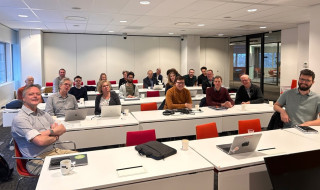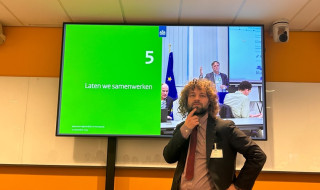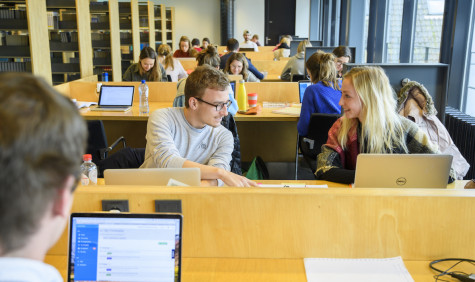Seize all opportunities of open source, start an OSPO
Driven by public values
The kick-off took place on 20 December at SURF in Utrecht, where over 20 enthusiasts for open source had gathered. "Open source is becoming increasingly important in education and research, but it is not an end in itself," says Wladimir Mufty. He is Public Values programme manager at SURF. "Open source helps us realise a number of important public values. Think of autonomy: by working on the basis of open source, you are much less dependent on the big tech companies."
Warning bell
Open source has been around for a long time, but in education, the topic gained wings in 2019, when rectors magnifici sounded the alarm in the Volkskrant about dependence on US tech companies. Among other things, this led to a mandate from UNL to SURF: "Make work of public values in education and research". Part of that assignment was to agree with the sector on which open source products we will use.

Over 20 enthusiastic participants at the successful kick-off of the OSPO for education and research
Encouraging role for the sector
Fortunately, SURF itself already had experience with open source. For instance, many of our services have already been developed using open source. Think of SURFdrive, SURFfilesender, SURFconext. But we have also been requiring vital software components to be developed open source for years when tendering for the supercomputer. And of course we have recently started working on our own open source language model GPT-NL, together with NFI and TNO.
But yes, doing it yourself is still something else than playing a stimulating role for the whole sector. In recent years, SURF has therefore been working on a plan to flesh this out. Corno Vromans, who works with Wladimir on public values: "This plan for open source has been given a prominent place in the Public Values working agenda we recently drew up."
OSPO community for open source in education and research
Part of that plan is the establishment of an OSPO community. This should be a community by and for employees in education and research who are concerned with open source, and want to promote the topic within their organisations. For example, by setting up an OSPO themselves. SURF, with members in MBO, HBO, WO and research, is committed to bringing together the members of the new OSPO community.
Open source since 2011
One of the speakers at this kick-off meeting at SURF is Joost Icke of Deltares. One of their main software products, Delft3D, has been available open source for 12 years. "In 2011 we switched to open source with Delft3D and that was quite exciting: we really had to do things differently," says Joost. "We had to think about a new policy for software distribution: how do you keep generating income if you make the software available free of charge. One way we do that is by providing support, and compiling and field-testing software. So getting started with open source, think carefully about a future-proof business model."
Showing impact of software
At the eScienceCentre, too, they develop all their software open source. "For us, sustainability, reusability and software quality are important aspects of open source," says Maaike de Jong. "We promote reusability, for example, through our Research Software Directory, in which researchers can display their software, and show its impact."
Enthusiasm but also scepticism
Daniël Vos founded the first university OSPO, at the RUG. At the RUG, Google products are still widely used, but they want to make the move to open source. "In our OSPO, we want to unite colleagues who are now working on open source separately from each other," says Daniël. "We also want to bring about a culture change. This is necessary, but not easy. I have had many conversations at the coffee machine. And then it turns out that there is a lot of enthusiasm, but also a lot of scepticism about working with open source. We really want to do something with that as OSPO."
Gathering useful information
There are sounds of recognition from the audience. "I myself am very enthusiastic about open source, we have to work with it," says Heino Brink from Graafschapcollege. "But at our school I see that the knowledge about it has actually diminished in recent years, because we outsource a lot in the cloud. During this meeting, I gather useful information to make the case within my organisation that we should start making policies for open source. So that we can at least make a more balanced choice between open and closed software. An OSPO can help make this policy, by acting together."
OSPO can be a catalyst
Hans-Peter Ligthart of SIVON also joined the meeting. He too clearly sees added value in a sector-wide OSPO community: "SIVON is a cooperative for primary and secondary education. If open source is to catch on among our members, we need to offer it as a service. We are not that far yet. There are still many questions, for instance: what are the conditions, but also: how do we ensure that open source becomes better known among our members? An OSPO can be a catalyst to answer these kinds of questions and get the process towards open source going."
Community connection
Being a catalyst is exactly what Karim El Assal, open source manager at TNO, aims to do. Among other things, he ensures that facilities are available within TNO to develop open source, and provides internal knowledge sharing on the subject. "One of the challenges I still see is community connection: if we have built a nice open source application, how do we find people who can also use it, or want to build on it?"

Boris van Hoytema, OSPO of the Interior Ministry, invites cooperation on open source.
No policeman
The final speaker of the day is Boris van Hoytema. He fulfils the OSPO role for the Ministry of the Interior and Kingdom Relations. He too stresses the importance of paying attention to culture change. "We come from a closed culture in software development and now have to start working together in an open way. That takes getting used to." And of course, he pays a lot of attention to making and propagating open source policy. "I see it mainly as my role to help people apply the policy, I don't want to play policeman."
Coming together, learning, inspiring
It is clear to everyone in the room: open source really has the future, we need to make structural work of it within education and research. But there is still a lot to do. SURF's freshly established OSPO community wants to play a role in this. Advocates for open source can come together, learn from each other and inspire each other. And through the community we can make policy so that others can develop or purchase open source software more easily and with fewer barriers.
Want to know more?
If you would like to participate in SURF's OSPO community, or keep abreast of developments, please send an email to SURF's Public Values team at publiekewaarden@surf.nl.
